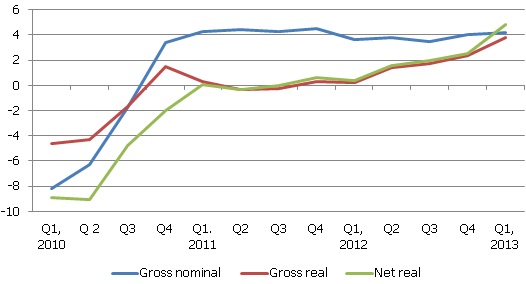Wage purchasing power is growing
In line with our forecasts, the annual rise in average salary remained moderate (4.2%). With inflation possibly reaching the lowest level, salaries are growing increasingly rapidly in real terms: in the first quarter of 2013 by 3.8%. However, even this rather substantial increase in income poses no threat to price stability and economic competitiveness. The balance between salaries and productivity remains the case.
The increase in productivity in the first quarter of 2013 calculated according to the official statistics, could be ill-assessed because of the overvaluation of employment data. According to the labour force survey conducted by the Central Statistical Bureau (CSB), employment grew 4.7% year-on-year, which, according to the CSB flash data on GDP growth (3.1%) would mean a drop in productivity by 1.6%. To approximate the results of the labour survey, however, the population as it was at the beginning of 2012 was used (the population at the beginning of 2013, with adjusted migration, is expected to be announced by CSB on 12 June). According to our calculations, that overestimates the number of the employed in the first quarter of 2013 by about ten thousand.
Therefore there is reason to doubt any drop in productivity. We should note that the real increase in employment is still impressive and, in the first quarter of 2013, it could still be among the fastest in the European Union, just as in 2011 and 2012.
Over the last year, the rise in salaries has been similar in both the private and public sectors. Over recent quarters, it has speeded up in the private sector. Salaries have risen in all main branches of the economy. Our wage forecasts remain unchanged: we expect a rise in average salary within the 4-5% range.
In January 2013, the personal income tax rate on salaries dropped by 1 percentage point (to 24%), therefore the net salary purchasing power grew even more rapidly over the year, by 4.8%. Along with the sustained rise in employment, it is a good support for domestic demand, which can help to protect Latvian businesses from the possible instability in external markets. Without a rise in external demand, however, real wage rise at the existing rate are not sustainable in the long term.
Annual rise in average monthly salary (for full-time work), %

Textual error
«… …»






